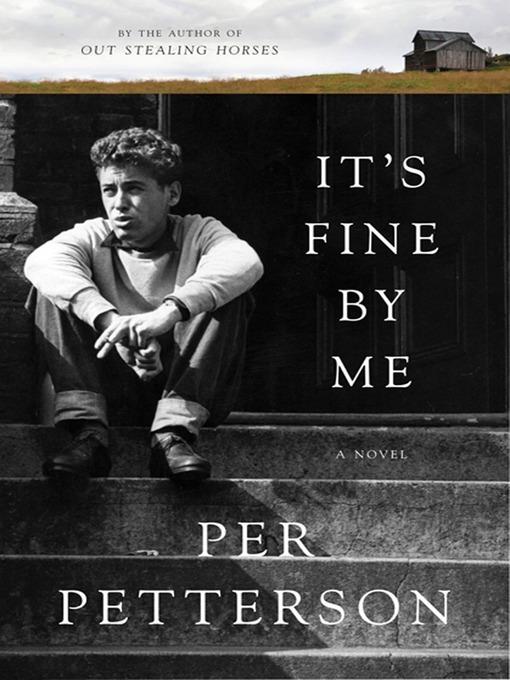
It's Fine by Me
A Novel
کتاب های مرتبط
- اطلاعات
- نقد و بررسی
- دیدگاه کاربران
نقد و بررسی

June 25, 2012
Part of Petterson’s backlist (which is being published in English following the breakout success of Out Stealing Horses), this spare but memorable novel features Arvid Jansen, the protagonist of I Curse the River of Time, as the only friend of Audun Sletten, a young man whose reticence conceals a wellspring of feeling. Not a lot happens in the novel: a teenage Audun moves to Oslo and a new school; allows himself to be befriended by Arvid; reads Hemingway and dreams of becoming a writer; remembers his dead brother, Egil, and his cruel father; and tries to take care of those he loves—his mother, his sister, and his friend—without showing too much emotion. Fans of Petterson will recognize his confident prose, as well as his concern with solitude and the essential privacy of experience, but one need not be familiar with the author’s oeuvre to appreciate his precise storytelling. Petterson’s achievement in this work lies in conveying the passionate alienation of a young man caught between a childish need for protection and a powerful desire to protect. Rights director: Jane Kirby, Random House.

September 1, 2012
Coming-of-age in 1960s Norway; the fifth novel from the Norwegian native, best known for Out Stealing Horses (2007). It's his first day at a new school in Oslo. He's late. He's wearing sunglasses. He refuses the headmaster's order to remove them. He won't tell his fellow students where he's from. The message is clear: Don't bother me. This is Audun Sletten, the 13-year-old narrator, in 1965. Why the hard shell, the truculence? His father is an abusive alcoholic. When he fired a gun through the kitchen window, it was the last straw for his mother, who moved them out. We do return to 1965, but most of the action takes place in 1970. Audun is now a high school senior; he has an early-morning paper route and is always tired in school. He is proud of his working-class identity. He is deeply influenced by American culture, loves Jimi Hendrix and Jack London, but is adamant the Americans leave Vietnam. Fiercely self-reliant, he stays clear of organizations after having been expelled from the Boy Scouts. We have met Audun before, in different settings; he's the alienated young Westerner, and Petterson hasn't done enough to individuate him. He's always fighting; he drops out of school to work at a printing press, but gets into fights while still a trainee. One respite from the violence came in 1965, when Audun was sheltered by a farmer and his wife; in the novel's best scenes, the boy luxuriates in the idyllic calm and the wife's maternal attention. We could have used more such contrasts with the monotonous flurry of fists and at least the suggestion of a romantic life. As it is, it's his undercharacterized mother who finds a new partner, in a crowded ending that includes the discovery of a dead body. Will Audun ever break free of his father's legacy? Petterson leaves that key question hanging and the reader unsatisfied.
COPYRIGHT(2012) Kirkus Reviews, ALL RIGHTS RESERVED.

May 1, 2012
Petterson followed up Out Stealing Horses, his beloved 2007 International IMPAC Dublin Literary Award winner, with the tale of luckless Arvid Jensen in 2010's quietly inflected I Curse the River of Time. This book backtracks to Arvid's youth, when he befriends the iconoclastic new boy Audan. Essential for upmarket readers.
Copyright 2012 Library Journal, LLC Used with permission.

September 15, 2012
As the new boy in high school, Audun refuses to remove his dark glasses ( I liked the distance they created ), and his wry, melancholy first-person, present-tense narrative nails how the teen's defiance hides his fragility. Expelled from Boy Scouts, he knows he will never again join an organized group. Haunted by the death of his brother, Ergel, in a car accident, Audun remembers Ergel as a pain in the ass, never mind the priest's sentimental waffle at the funeral. Like Petterson's award-winning Out Stealing Horses (2007), featuring Audun's friend Arvid, this story is as much about what is not spoken as it is about the angry daily detail ( It's funny the things you don't forget ). Much of the focus is on work, as Audun gets up early to run a paper route, then later quits school for a job in a printing press, until he is fired and cannot go home. The casual comments intensify the heartbreak: Why did his father leave? The spaces make the answers (or lack of them) universal.(Reprinted with permission of Booklist, copyright 2012, American Library Association.)

























دیدگاه کاربران